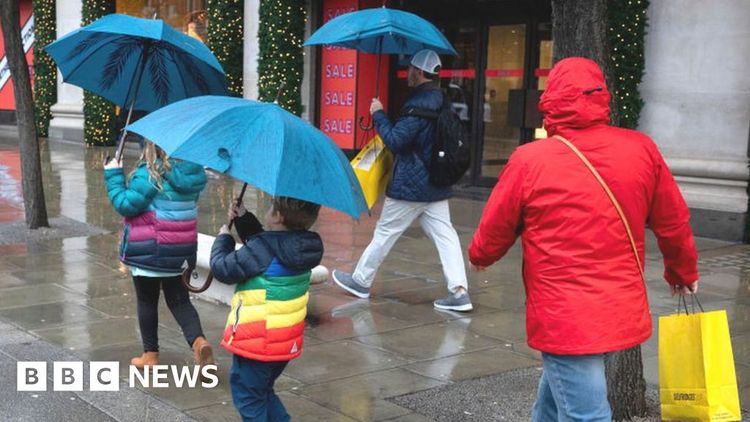UK Economy Hit By Strikes, Living Costs

The above picture is credited to Getty Images.
. The rainy weather in March affected trade on the High Street. Many people stayed at home instead of shopping. Retailers suffered as a result of the lack of foot traffic. It was a difficult month for businesses. They'll be hoping for better weather in the coming months.
The UK economy grew slowly in Q1 due to strikes, high living costs, and rainy weather.
From January to March, the economy only grew by 0.1%. The economy is not as big as it was before Covid.
Other big countries are growing faster than the UK.
The Bank of England said good news on Thursday. They think the UK will not have a recession. They are optimistic about the future.
The Bank raised interest rates from 4.25% to 4.5%. This was done to control rising prices. The Bank hopes this move will be effective in curbing inflation.
The economy grew a bit in the first three months of 2023. However, in March, it got smaller by 0.3%. The car sales and retail industry didn't do so well that month. These details came from the ONS numbers.
According to the ONS, the economy is still smaller by 0.5% than it was before the pandemic.
UK did better than Germany in Q1, but other big economies grew faster.
The head of investment at Interactive Investor is Victoria Scholar. She said that inflation is high, real wage growth is negative, and living costs are causing problems for the consumer. This is hurting the services industry, which is normally a big part of the UK economy's growth.
The Bank of England and government must lessen inflation for a service revival. The new figures show this. It is a tough task.
Darren Morgan works at the ONS and is in charge of economic stats. He said that IT and construction helped growth in the first few months, but strikes in health, education, and public administration hurt it too.
In an interview with the BBC, Mr. Morgan said car sales were not very good in March. He also mentioned that bad weather stopped people from going to shops, which impacted retail sales.
The man said food store sales went down. Retailers said the expensive cost of living and higher food prices are impacting how much people spend.
The economy grew by only 0.1% in the first quarter of this year. This growth is very low. In March, the service sector had problems. Car sales were also not good. This is concerning.
There are two things that affect the situation: strikes and the weather. But the bigger issue is the slow pattern that has been going on for a year. Energy prices have gone up and Germany is not growing. The UK economy has not fully recovered from the pandemic and Brexit, even on a quarterly basis.
The next quarter might decline due to the extra bank holiday. Experts predict growth will rise again in the second half of the year.
The economy is doing better than expected despite a big energy shock and other crises. The Bank of England says that households haven't felt the full effects of previous rate increases.
The UK has to wait for take-off despite the economy growing.
The economy is growing and the Chancellor, Jeremy Hunt likes it. The government wants more growth, so Hunt says we need to focus on taxes, labor and productivity.
Rachel Reeves, the shadow chancellor, stated that today's low growth record marks another disappointing day in the book of the Conservative government. Despite the country having potential and promise, it has not been fulfilled.
Starship Group's MD David Dargan is optimistic about the economy's future, according to the BBC.
The construction industry is facing higher prices, according to David Dargan. This is now a "new norm" for the sector.
He said that the construction industry is facing challenges like rising costs, material and labour shortages. But he thinks that the industry is resilient and has found ways to trade through it.
The construction sector is dealing with new expenses. Clients are taking time to get used to the changes.
The economy got smaller in March. Yael Selfin, who works for KPMG, says this shows it is fragile. Energy prices are lower and goods are easier to get, but consumer confidence is not enough to fix it.
Business and household activities may slow down this year, even though the economy is probably not going to experience a recession. The cause of this is likely higher borrowing costs which produce vulnerabilities.





























































